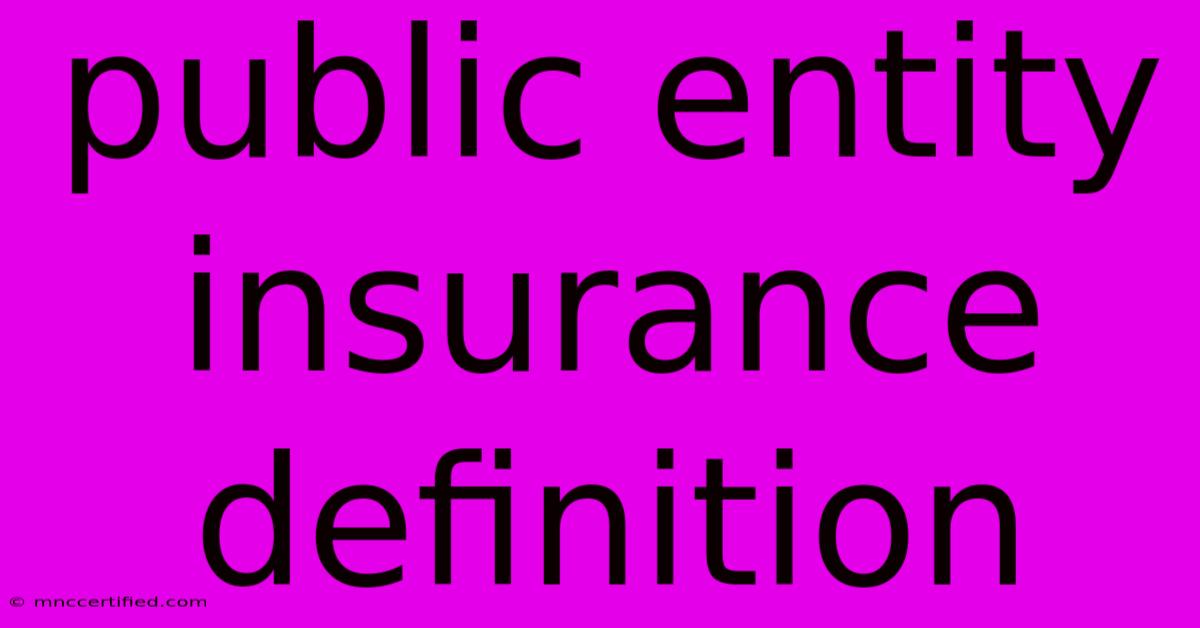Public Entity Insurance Definition

Table of Contents
Public Entity Insurance: A Comprehensive Guide
Public entity insurance is a critical aspect of protecting government agencies, municipalities, and other public organizations from financial losses due to various risks. Understanding its nuances is crucial for ensuring the smooth operation and financial stability of these entities. This comprehensive guide will delve into the definition, types, and importance of public entity insurance.
What is Public Entity Insurance?
Public entity insurance, also known as public sector insurance or government insurance, is a specialized type of insurance designed to protect public entities from liability and property damage claims. Unlike private sector insurance, it caters to the unique risks faced by government organizations, including schools, hospitals, municipalities, and other public bodies. These risks can range from accidents and injuries on public property to lawsuits alleging negligence or misconduct.
Key characteristics of public entity insurance:
- Covers a wide range of risks: This includes general liability, property damage, professional liability (errors and omissions), vehicle accidents, and workers' compensation.
- Tailored to public sector needs: Policies are specifically designed to address the unique legal and operational challenges faced by public entities.
- Often provided through specialized insurers: Many insurance companies specialize in providing coverage for public entities, understanding their specific needs and regulatory environments.
- May involve self-insurance or pooling: Some public entities manage risk through self-insurance programs or join risk pools with other entities to share costs and mitigate losses.
Types of Public Entity Insurance Coverage
Public entity insurance encompasses several essential coverages:
1. General Liability Insurance
This protects the entity against claims of bodily injury or property damage caused by its operations or employees. Examples include slips and falls on public property, damage caused by a city vehicle, or injuries sustained during a public event.
2. Property Insurance
This covers damage to or loss of public property, such as buildings, vehicles, and equipment, due to fire, theft, vandalism, or natural disasters.
3. Professional Liability Insurance (Errors & Omissions)
This protects against claims of negligence or errors in professional services provided by public employees, particularly in areas like law enforcement, education, or healthcare.
4. Workers' Compensation Insurance
This covers medical expenses and lost wages for employees injured on the job. It's a crucial aspect of protecting public employees and complying with labor laws.
5. Auto Liability Insurance
This protects the entity from liability resulting from accidents involving its vehicles.
6. Cyber Liability Insurance
With the increasing reliance on technology, this coverage protects against data breaches, cyberattacks, and other cybersecurity incidents. This is becoming increasingly important for public entities handling sensitive citizen data.
Why is Public Entity Insurance Important?
Public entity insurance is vital for several reasons:
- Financial protection: It shields the entity from potentially devastating financial losses stemming from lawsuits, accidents, and property damage. Large claims can severely impact public budgets and services.
- Risk mitigation: Proper insurance helps manage and mitigate risks, allowing public entities to focus on their core mission of serving the public.
- Legal compliance: Many jurisdictions mandate certain types of insurance coverage for public entities. Failure to comply can result in significant penalties.
- Public trust: Demonstrating a commitment to risk management and financial responsibility through adequate insurance coverage enhances public trust and confidence in the entity.
Choosing the Right Public Entity Insurance Provider
Selecting the right insurance provider is crucial. Factors to consider include:
- Financial strength and stability: Ensure the insurer has a strong financial rating to guarantee claims payments.
- Experience with public entities: Look for insurers with a proven track record of serving similar organizations.
- Coverage options and customization: Choose a provider offering comprehensive coverage tailored to your specific needs.
- Claims handling process: Investigate their efficiency and responsiveness in handling claims.
- Customer service: A reliable and responsive insurer is essential for a smooth experience.
Public entity insurance is not merely a cost; it's a strategic investment in the financial security and operational effectiveness of government and public organizations. Understanding its intricacies and selecting the appropriate coverage is critical for protecting public assets, resources, and the public's trust.

Thank you for visiting our website wich cover about Public Entity Insurance Definition. We hope the information provided has been useful to you. Feel free to contact us if you have any questions or need further assistance. See you next time and dont miss to bookmark.
Featured Posts
-
Colonial Penn Insurance Commercial
Nov 16, 2024
-
Romania Kosovo Prediction Lineups Team News
Nov 16, 2024
-
Disney Stock Extends Winning Run
Nov 16, 2024
-
Insurance And Risk Management Fbla
Nov 16, 2024
-
Nations League Accumulator 140 Return
Nov 16, 2024